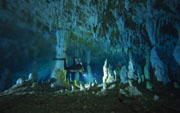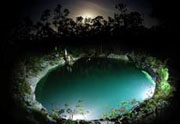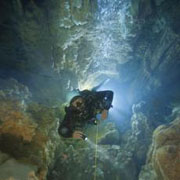-
(单词翻译:双击或拖选)
EXPLORATIONS - Blue Holes: Some of the Least Explored Areas on Earth
BARBARA KLEIN: I’m Barbara Klein.
STEVE EMBER: And I’m Steve Ember with EXPLORATIONS in VOA Special English. A blue hole is a flooded sea cave with a hole that opens up at the land’s surface. These cave systems form in carbonate rock, often on islands. Some blue holes have very special rock formations and water chemistry. Far below sea level, they contain some of the harshest environments on Earth, with no oxygen and no light. Yet these areas are filled with life forms that have adapted to the extreme conditions.
Information gathered from these blue holes is helping1 scientists to increase their understanding of biology, archaeology2 and geology. But exploring these blue hole environments brings danger as well as discovery.
(MUSIC)
BARBARA KLEIN: Blue holes get their name from the color some have when seen from the air. The color is usually a reflection of the sky on the water. But not all of these cave systems have blue surfaces. Some contain dark or muddy water.
 |
| Diving deep in a blue hole |
Blue holes are the result of erosion in which water breaks down rock. Rain falling thousands of years ago contained chemicals which slowly wore away at the limestone3 landmass. These holes later filled with sea water as the sea level changed. The rising and falling of sea levels and the mixture of salt and fresh water further wore away at these cave formations. Blue holes are vertical4 caves. But they can also have horizontal cave formations that may be hundreds of meters long.
STEVE EMBER: These flooded cave systems can be found in the ocean, or they can be found inland. Ocean caves are affected5 by tides, so they always have water movement. But blue holes on land are very still. They have several layers of water, chemicals, and bacteria. The top layer of fresh water comes from rainfall. This layer acts like a cap on top of the layered mixture, and keeps out oxygen from the atmosphere. The fresh water floats on a denser6 layer of saltwater. Underneath7 this is a layer of poisonous hydrogen sulfide, produced by bacteria living in the water. Underneath this layer is anoxic seawater -- water that does not contain any oxygen.
 |
| A blue hole in the Bahamas |
BARBARA KLEIN: Kenny Broad is an anthropologist8 at the University of Miami in Florida. He studies the effects of climate change and human understanding of its risks. He has spent several years exploring underwater caves in the Bahamas. Here Mr. Broad discusses his many cave explorations during a talk at the National Geographic9 Society in Washington, D.C.
KENNY BROAD: “Underwater caves are probably, I would argue, one of the least understood ecosystems10 on the planet. One of the reasons they are one of the least understood, they are one of the least explored. And they are one of the last places where you still physically11 have to go there, you can’t send in a submarine or a mode operated vehicle, some autonomous12 machine. You need to go there.”
STEVE EMBER: Kenny Broad helped organize the Bahamas Blue Hole Expedition. In two thousand nine, a team of scientists spent two months researching blue holes on Bahamian islands including Andros and Abaco. The trip received financial support from the National Geographic Society.
(MUSIC)
BARBARA KLEIN: One reason blue holes have not been fully13 explored is that they can be extremely dangerous. There are many safety rules that divers14 must follow to help ensure their survival. First, divers must have training and experience to swim in these caves.
Divers who explore a cave for the first time must establish a thin rope called a guideline. This line helps them to safely enter and exit the cave without getting lost.
Divers must also bring several light sources in case one fails. They also must bring more than one set of breathing equipment in case one device fails. And, they must pay careful attention to their air supply. The rule they follow is to use a third of their air to enter the cave, a third to exit, and a third for emergencies.
STEVE EMBER: There are many difficulties involved in diving in blue holes. In some blue holes divers must quickly swim through a layer of hydrogen sulfide to reach the horizontal caves further down. This gas causes itchy skin, dizziness, and in high enough quantities, death. Or, divers might face extremely strong currents that can suck them into an opening. If they are not careful with their movements they can disrupt an area of a cave, creating explosions of silt15 which makes it impossible to see clearly. Kenny Broad shows a video of a diver forcing his body through a very narrow rocky opening.
KENNY BROAD: “It’s a mental game, it is not a physical game. This isn’t macho, and it’s not thrill-seeking. It’s more about keeping your breath rate under control.”
BARBARA KLEIN: For most explorers, though, the possibility of discovery in these cave environments makes the experience worth the risk.
KENNY BROAD: “You can jump into what looks like an insignificant16 little hole in the ground, and come out with information that’s of value to many different disciplines, from a scientific-academic perspective.”
Scientists are interested in these caves because oxygen-free conditions there are similar to those on Earth long ago, before oxygen existed on our planet.
KENNY BROAD: “What was life like? And when I say the ancient oceans, maybe a more dramatic way to phrase this question is ‘How did life form?’ I’m talking about life three point five billion years ago.”
He says the microbes that were present then did not leave a clear fossil record for scientists to study. So studying the organisms in these oxygen-free caves gives clues about the past.
KENNY BROAD: “So what happens here is we have a modern day analogy for what the oceans were like in terms of both the chemistry and the biology.”
 |
| Kenny Broad dives in Dan's Cave on Abaco |
STEVE EMBER: Experts are not only interested in life on our planet. Astrobiologists can compare information about these organisms and their environment to other oxygen-free environments, like those in space. They study these extreme conditions to understand how and where life might exist on other planets.
Larger organisms are equally interesting to scientists. Most are colorless and cannot see. For example, the Agostocaris cave shrimp17 is only about two and a half centimeters long. It has no color except an area of its digestive system. Then there is the remipede. Some scientists describe it as a living fossil. It has changed very little over the past three hundred million years. Remipedes are less than five centimeters long, but they are fierce. They use their poisonous teeth-like fangs18 to kill shrimp and other creatures.
BARBARA KLEIN: Blue holes also permit scientists to study climate change over thousands of years. They want to understand what those changes could mean in the future.
Some of the horizontal caves have calcite formations called stalagmites and stalactites. They formed little by little tens of thousands of years ago when sea levels dropped. Scientists can study these formations and map out the climate conditions present during every year of their growth.
(MUSIC)
STEVE EMBER: Because blue holes contain no oxygen, they also protect ancient objects from the destruction of time. For example, divers in Sanctuary19 Blue Hole on the island of Andros in the Bahamas found the ancient bones of native Lucayan tribe members. Experts are not sure whether this tribe placed bodies in caves as part of burial ceremonies or for other reasons.
Animal remains20 are also preserved in excellent condition. Divers in Sawmill Sink on Abaco Island found the three-thousand-year-old remains of a Cuban crocodile. This kind of crocodile has long disappeared from the Bahamas. They also found some ancient turtle skeletons. They were so well preserved they still had pieces of soft tissue.
BARBARA KLEIN: The Bahamas may have more than a thousand blue holes. But only about two hundred have been discovered. This includes the world’s deepest known blue hole, called Dean’s Blue Hole on Long Island. It measures two hundred two meters in depth.
Kenny Broad and his team spent time talking with native Bahamians to ask them if they knew where the team could find other blue holes. He says younger generations are generally not aware of such caves. But their parents know about them and once used them.
KENNY BROAD: “What’s interesting, though, is that when you talk to these folks’ parents, they were keenly aware of these holes because they used them as their source for drinking water. They used them for all sorts of medicinal reasons. And now they are ignored, and in fact in lots of places we can’t even drink the water because of what goes into these holes.”
STEVE EMBER: Many blue holes have become areas where people throw away waste. But these actions are polluting an important source of fresh water. Part of Kenny Broad’s goal is to raise awareness21 about these underground areas so local communities will take better care in protecting them.
He says these caves and fresh water sources are not given much attention because they are hard to see.
Another threat these cave systems face is rising sea levels. As sea levels rise, the careful balance of chemistry and nature in these caves could be destroyed.
BARBARA KLEIN: Kenny Broad says these blue holes must be protected for several reasons. They are important for environmental and scientific discoveries. These caves also give a few explorers an extraordinary chance to see life in a beautiful and strange environment that is like no other on Earth.
STEVE EMBER: This program was written and produced by Dana Demange. I’m Steve Ember.
BARBARA KLEIN: And I’m Barbara Klein. You can see pictures of blue holes at voanews.cn. Join us again next week for EXPLORATIONS in VOA Special English.
 收听单词发音
收听单词发音
1
helping

|
|
| n.食物的一份&adj.帮助人的,辅助的 | |
参考例句: |
|
|
|
2
archaeology

|
|
| n.考古学 | |
参考例句: |
|
|
|
3
limestone

|
|
| n.石灰石 | |
参考例句: |
|
|
|
4
vertical

|
|
| adj.垂直的,顶点的,纵向的;n.垂直物,垂直的位置 | |
参考例句: |
|
|
|
5
affected

|
|
| adj.不自然的,假装的 | |
参考例句: |
|
|
|
6
denser

|
|
| adj. 不易看透的, 密集的, 浓厚的, 愚钝的 | |
参考例句: |
|
|
|
7
underneath

|
|
| adj.在...下面,在...底下;adv.在下面 | |
参考例句: |
|
|
|
8
anthropologist

|
|
| n.人类学家,人类学者 | |
参考例句: |
|
|
|
9
geographic

|
|
| adj.地理学的,地理的 | |
参考例句: |
|
|
|
10
ecosystems

|
|
| n.生态系统( ecosystem的名词复数 ) | |
参考例句: |
|
|
|
11
physically

|
|
| adj.物质上,体格上,身体上,按自然规律 | |
参考例句: |
|
|
|
12
autonomous

|
|
| adj.自治的;独立的 | |
参考例句: |
|
|
|
13
fully

|
|
| adv.完全地,全部地,彻底地;充分地 | |
参考例句: |
|
|
|
14
divers

|
|
| adj.不同的;种种的 | |
参考例句: |
|
|
|
15
silt

|
|
| n.淤泥,淤沙,粉砂层,泥沙层;vt.使淤塞;vi.被淤塞 | |
参考例句: |
|
|
|
16
insignificant

|
|
| adj.无关紧要的,可忽略的,无意义的 | |
参考例句: |
|
|
|
17
shrimp

|
|
| n.虾,小虾;矮小的人 | |
参考例句: |
|
|
|
18
fangs

|
|
| n.(尤指狗和狼的)长而尖的牙( fang的名词复数 );(蛇的)毒牙;罐座 | |
参考例句: |
|
|
|
19
sanctuary

|
|
| n.圣所,圣堂,寺庙;禁猎区,保护区 | |
参考例句: |
|
|
|
20
remains

|
|
| n.剩余物,残留物;遗体,遗迹 | |
参考例句: |
|
|
|
21
awareness

|
|
| n.意识,觉悟,懂事,明智 | |
参考例句: |
|
|
|















